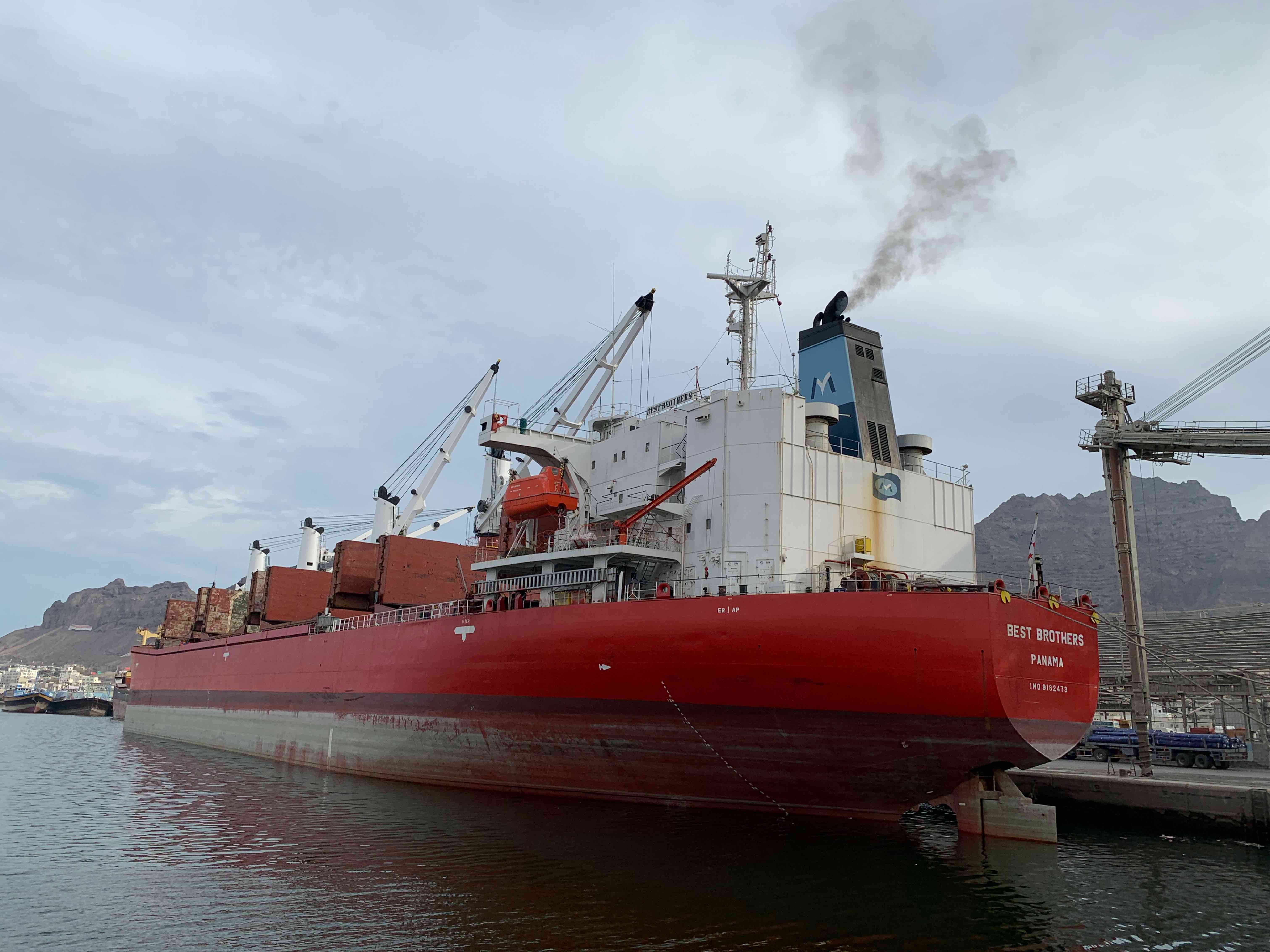Inside Aden Port. Photo Credit: UNDPYemen/2020
My dad was a sea Captain for 40 years, navigating the world’s ports from Lagos to Caracas. My first memories were on his ship and the first five years of my life were spent at sea with him and my family. I still relish listening to his tales of the great oceans and vivid memories of his adventures.
The love of the sea has never left me. As a young business and economics student, I rode my bicycle to the Port of Rotterdam to watch the ships sailing out to sea, soaking in the salty air, and watching the hustle and bustle in a seaport. Even from a distance, the port’s economic importance can hardly escape anyone; they can either breathe life into a country or cause it to suffocate.
Ports in Yemen are no different. As a matter of fact, they may play an even more significant role than in other countries. In recent years – due to the conflict and other facts – Yemen has increasingly relied upon food imports to feed its people. Many farmers have turned to much more lucrative cash crops such as qat instead of producing consumable and nutritious food. This has resulted in Yemen having to import 90 per cent of its food requirements, all of which passes through Yemen’s ports.
Photo Credit: UNDP Yemen/2020
The ports are crucial to Yemenis having access to food, but not necessarily with them being able to eat. You see, the food shortage in Yemen is unique and not at all what you would expect. Yemen is on the brink of famine because of the cost associated with the imported foods, not because it is unavailable; nearly half the population receives food aid from the international community. The conflict has thrust many out of a job, those with employment must work for less pay, and civil workers have not been paid regularly – or fully – in years.
To put it plainly: The markets are overflowing with food, but Yemenis cannot afford it.
One of the contributing factors to the high food prices in Yemen is the cost of doing business in the seaports. Damage from the war and years of neglect have had severe negative impact on the ports’ infrastructure and equipment, leading to congestion and long waiting times before vessels can berth. In addition, “war risk” insurance is being imposed on ships arriving to Yemeni ports and terminals by their insurers; the highest of which is in Aden.
Congestion, insurance premiums, and inspections are causing significant additional expenses for importers – nearly doubling the price of shipping for every container. The costs are being directly absorbed by consumers at the markets, grocery stores and shops – a cost that few Yemenis can afford.
To help put food on the average Yemeni table, UNDP is working in a unique public-private partnership with the Ports of Rotterdam and the national Port Authorities in Yemen to find manageable solutions.
Photo Credit: UNDP Yemen/2020
In July 2019, we assessed the Ports of Hodeidah, Salif, and Ras Issa in the north and now we are undertaking similar exercise in the Ports of Aden and Mukalla in the south. These technical assessments are crucial to helping ensure Yemen’s major ports can function more optimally – including in compliance with international standards and with efficiency and safety.
If we work to fix vital port infrastructure such as the cranes, the navigation system, the storage capacity, and the buoys – for example – then it will increase the ship numbers that sail into the ports, decrease the very expensive time spent in dock to offload cargo, and decrease the cost of insurance for shipping lines and trading companies wanting to do business in Yemen. These are costs absorbed directly by the consumers – one of the issues associated with the high cost of food in Yemen.
In crisis countries like Yemen, investment in infrastructure is often overlooked, but UNDP views this as an extremely important effort to facilitate the entry of humanitarian assistance, to build peace, and to invest in the development and future growth of Yemen. This – like many of our other recovery projects – will play a vital role in helping Yemen to build forward better.
As a student standing at the Port of Rotterdam, I never imagined that I would be standing at the ports of Yemen – a half a world away from Rotterdam – watching ships sail in and out and observing the sea Captains like my dad and their crews. But the difference now is that the ships’ precious cargo helps save over 24 million people who mostly rely 100 per cent on the food and humanitarian aid to survive the ongoing conflict and their harsh reality.
The work we are embarking upon with the Port of Rotterdam and the Port Authorities will revitalize, rehabilitate, and modernize the ports – resulting in reduced costs for Yemeni households and allowing them to afford food for their families. This presents them with opportunities to use the extra savings for school, food, and shelter – and ultimately provides them with hope for their own future and that of Yemen.
About the Author
Mr. Auke Lootsma has been serving in Yemen as the Resident Representative since February 2019. He begain his tenure in Sana'a as Country Director in August 2016.
Mr. Lootsma's career with UNDP began in 1994. Previously, Mr. Lootsma has served as the Country Director in Rwanda; Senior Recovery Advisor in Ukraine; Deputy Country Director (Programme) in Sudan; and, Deputy Resident Representative (Programme) in Uganda. He holds a Master of Science in Business Administration and Development Economics.
Related Resources
Damage and Capacity Assessment for Ports of Hodiedah, Salif and Ras Issa

 Locations
Locations




